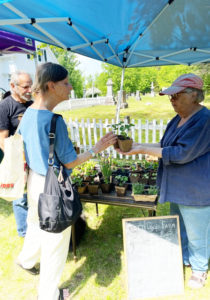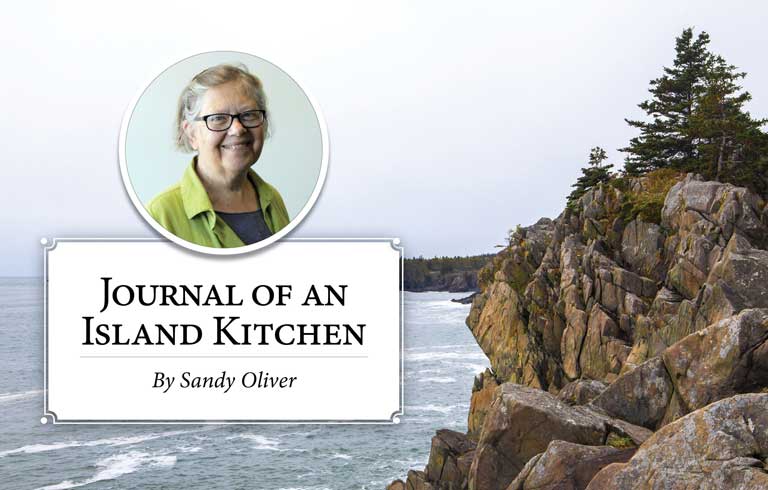Sunday afternoons, starting the last Sunday in May, a small farmer’s market sets up next to the Up-Island Church (formerly the Free Will Baptist Church, now a preservation society) while cars line Church Turn containing customers ready to pounce on seedlings, vegetables, eggs, honey, all kinds of island-grown fresh stuff.
The Up-Island Farmers Market had its start in the fall of 2019, when a summer-long Wednesday morning farmer’s market at the community center with mainland vendors ceased at the end of August when summer crowds diminished. Island producers added themselves to the mainlanders who offered vegetables, meat, cheese, soap, oils, berries, and bread.
Only a few decades ago, Islesboro people grew a great deal of food…
But at the end of August, harvesting continued and islanders still had vegetables to sell, and so they took themselves up-island and set up shop. Locals still wanted fresh vegetables and the little market worked well enough that it all just began again the following June, soldiering on through the pandemic summer with customers in masks respectfully maintaining distances.
It’s island food for island people. Some customers stop en route to or from the transfer station, which is open on Sunday for people whose work lives make the Monday and Wednesday open times a bit inconvenient.

If we learned anything during the pandemic, it was that supply chains are long and often fragile. Disease and hackers break them for sure. So does weather: witness how the Texas freeze affected citrus and livestock. Now, this summer, Western almond growers facing continued drought are uprooting their thirsty trees. When certain items aren’t actually scarce, they are expensive instead.
Meanwhile, only a few decades ago, Islesboro people grew a great deal of food—vegetables, meat, fruit, eggs—and produced milk for their own use and vended it to year-rounders and summer residents alike.
We even had a Grange. When the car ferry began operation, the ease of tapping into the mainland supply undermined on-island food production except for some families who always had gardens or kept a beef critter. Even though Islesboro is ledgey and full of mucky, swampy places and clayey soil, unlike North Haven with its farm-friendly geology, we can grow quite a lot of food.
So Pam Larson and Michael Hutcherson operate Growing Things, a market garden and greenhouse with an actual farmstand. They bag up salad greens and offer little white turnips, flower seedlings, and later a wide variety of vegetables, husk cherries, tomatoes, and charming round “snacking-cucumbers.”
Rachael Earl runs Endor Farm, well fertilized by sheep and horse, alive with chickens and ducks. She brings heirloom vegetable seedlings, gorgeous radishes, microgreens, and cartons of eggs now, later all kinds of vegetables, bundles of lovage. She sometimes brings Phyllis, her disabled hen, a survivor of an eagle attack, who rests in a blanket nest, and surveys the proceedings with mild interest.
C.J. Houle and her friend Nate sell honey in various forms, beeswax candles and beeswax soaked cloths for food storage. We are hopeful of a young mushroom grower joining us.
I’m there, too, the proprietor of Pretty Good Farm, now with lots of herb seedlings, rhubarb, lettuce six-packs, and later with very ordinary vegetables like loose leaf, romaine and head lettuce, cherry tomatoes, summer squashes, red and golden beets; later, with luck, corn. There’s always fresh herbs.
As summer wears on into the fall, customers acquire carrots, beets, garlic, potatoes, and winter squashes. We give up when the gardens do, or the weather discourages people from coming out.
Of course, we see friends, and part of the fun is catching up on our lives and times, especially now that the pandemic is retreating. Our market is mostly about food—vegetables, sometimes baked goods. For me, the main thing is getting locally produced, wholesome food into our neighbors, and if they buy from us we can continue to grow it and be sustainable.
Grain and meat are still a way off in the future if we ever get there at all, so I’m not going to kid myself about providing a whole diet for all islanders. I’ll just bet anything we can rebuild a lot of food production on island and when we do hackers can hack, climate can change, pandemics come and go, and we’ll sleep better at night with dinner in the ground outside our kitchen doors.
Sandy Oliver is a food historian who writes, gardens, and cooks on Islesboro.





